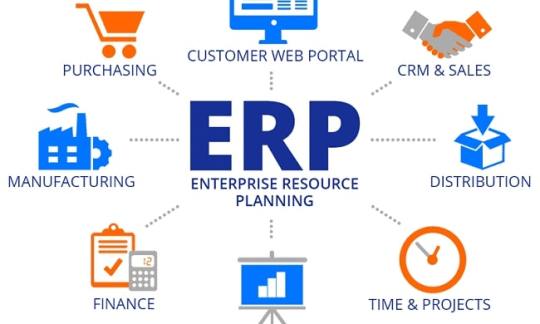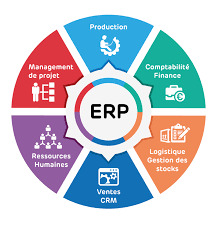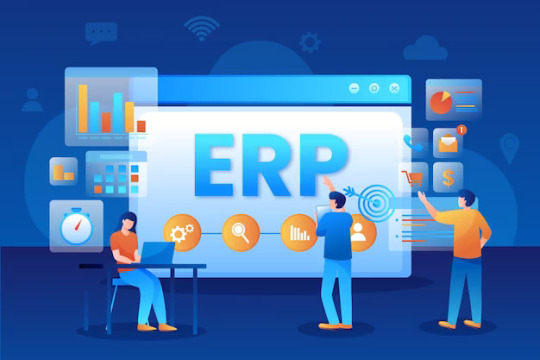#erp implementation services
Explore tagged Tumblr posts
Text
Expert ERP Implementation Services | Parkar Accounting
Streamline your business operations with professional ERP implementation services from Parkar Accounting. Our experienced team specializes in tailoring ERP solutions to fit your unique needs, enhancing efficiency, productivity, and decision-making. From system selection to seamless integration and ongoing support, we ensure a smooth transition for your business. Whether you’re upgrading your current system or implementing ERP for the first time, Parkar Accounting provides expert guidance every step of the way. Optimize your processes and achieve your business goals with confidence. Contact us today to learn more about our ERP implementation services!
0 notes
Text
#technews#Enterprise Resource Planning (ERP)#ERP Solutions#Business Management Software#Integrated Business Applications#Supply Chain Management#Customer Relationship Management (CRM)#Financial Management Systems#Human Resources Management#Inventory Management Software#Manufacturing Resource Planning#Cloud ERP Solutions#On-Premise ERP Systems#ERP Implementation Services#ERP Consulting#ERP Software for Small Business#ERP Software for Manufacturing#ERP System Integration#ERP Software Development#ERP Customization Services#ERP Training and Support
0 notes
Text
Transforming Your Business Potential with NetSuite ERP Implementation Services
In today's competitive business landscape, smooth operations and efficient resource management are very important for success. Companies looking for growth and operational excellence often turn to ERP implementation services to smooth their processes, optimize resources, and gain actionable insights.
Why Choose NetSuite ERP for Your Business? NetSuite, a cloud-based Enterprise Resource Planning (ERP) software, is renowned for its scalability and comprehensive functionality. It integrates essential business processes such as financials, customer relationship management (CRM), inventory management, e-commerce, and more, into a unified system. Whether you're a startup or an enterprise, NetSuite adapts to your needs, offering unparalleled flexibility.
The challenge, however, lies in implementing the system efficiently to ensure maximum ROI. This is where ERP implementation consulting makes the difference.

Entartes: Your Trusted Partner for ERP Implementation Services
At Entartes, we bring years of expertise in ERP implementation services, particularly with NetSuite. Our team of seasoned consultants understands that no two businesses are the same. We follow a customer-centric approach, customizing the ERP solution to align perfectly with your unique operational needs and long-term objectives.
Key Features of Our NetSuite ERP Implementation Services
Comprehensive Assessment - We begin by understanding your business processes, identifying pain points, and determining the right ERP configuration to suit your goals.
Smooth Integration - Our experts ensure that NetSuite integrates smoothly with your existing systems, enabling data consistency and eliminating operational silos.
Customization - Every business is unique, and so should be its ERP system. We tailor NetSuite’s modules to fit your industry and specific requirements.
End-to-End Support - From initial setup and configuration to post-implementation support, we guide you every step of the way.
Training and Knowledge Transfer - We empower your team with comprehensive training to maximize the utilization of NetSuite’s features. Benefits of Professional ERP Implementation Consulting
Implementing an ERP system is a complex task that requires strategic planning and technical expertise. Without proper guidance, businesses may face delays, cost overruns, and suboptimal system performance. Our ERP implementation consulting services ensure:
Minimized Risks: Expert planning reduces implementation errors and operational disruptions.
Cost Efficiency: Efficient project management helps avoid unnecessary expenses.
Scalable Solutions: Flexible systems designed to grow with your business.
Faster ROI: Streamlined processes lead to quicker realization of benefits.

Industries We Serve
Entartes caters to a diverse range of industries, including manufacturing, retail, e-commerce, healthcare, and more. Our in-depth knowledge of industry-specific challenges ensures that your NetSuite ERP implementation is not just efficient but also strategically impactful.
Partner with Entartes for Your ERP Success
Investing in ERP implementation services is a pivotal decision for your business. It’s not just about adopting new technology; it’s about embracing a system that drives efficiency, boosts productivity, and enables growth. With Entartes as your implementation partner, you gain the advantage of expertise, personalized solutions, and unwavering support.
Let us help you unlock your business’s true potential. Explore our ERP implementation consulting services and embark on a journey toward operational excellence with NetSuite ERP.
#erp implementation services#netsuite implementation services#netsuite erp implementation#erp implementation firms#erp implementation consulting#erp implementation service
0 notes
Text
Seamless ERP Implementation with Growthawk: Your Partner in Business Transformation
Growthawk specializes in ERP implementation services designed to streamline business operations and enhance productivity. Our expert team ensures a smooth, customized implementation process that aligns with your unique business needs, from planning and data migration to employee training and support. With Growthawk’s comprehensive ERP solutions, you can integrate core functions, improve real-time data access, and gain valuable insights to drive strategic growth. Let us help you unlock the full potential of ERP and empower your business for long-term success.
For More details visit our website: https://erp.growthawk.com/
0 notes
Text
ERP Implementation Services, ERP Business Development - Growthawk
Growthawk is a leading provider of ERP (Enterprise Resource Planning) solutions, specializing in business development and implementation strategies. We understand that the right ERP system can be a game-changer for your organization, streamlining operations, enhancing efficiency, and driving growth.
0 notes
Text
https://idctechnologies.com/idcdigital/digital-services.html
Discover IDC Technology's comprehensive ERP implementation services, ensuring seamless integration and optimized workflows for your business. Leverage our expertise to drive efficiency and growth.
0 notes
Text
Unlocking Success: The Art of Choosing ERP Migration Experts
ERP migration and implementation services involve the process of transitioning from one ERP system to another or implementing an ERP system for the first time. These projects can be complex and require expertise in ERP software, project management, and business processes. If you're looking for ERP migration experts or ERP implementation services, there are a few steps you can take:
1. Research ERP Service Providers: Look for ERP service providers that specialize in migration and implementation services. Consider their experience, expertise, and client testimonials to assess their capabilities.
2. Assess Your Requirements: Evaluate your organization's specific needs and requirements for the ERP migration or implementation project. This includes determining the scope, timeline, budget, and desired outcomes.
3. Request Proposals: Reach out to selected ERP service providers and request detailed proposals that outline their approach, methodology, resources, and estimated costs for the project. This will help you compare different providers and select the one that aligns with your requirements.
4. Evaluate Expertise: Assess the expertise of the ERP service providers in terms of their experience with ERP systems like yours, their knowledge of industry best practices, and their ability to handle data migration, integration, customization, and training.
5. Consider Project Management Capabilities: ERP migration and implementation projects require effective project management to ensure successful outcomes. Evaluate the project management methodologies and tools used by the service providers to ensure they can efficiently manage the project.
6. Check References: Request references from the ERP service providers and contact their previous clients to inquire about their experiences, satisfaction levels, and the provider's ability to meet expectations and deliver on time.
7. Collaboration and Support: Assess the service provider's approach to collaboration and post-implementation support. Determine if they offer training, ongoing technical support, and system maintenance to ensure a smooth transition and long-term success.

Remember that ERP migration and implementation services can be significant undertakings, so it's essential to choose a service provider with the right expertise, experience, and capabilities to meet your organization's needs.
At Contetra, we have helped companies big and small – from Silicon Valley unicorns and listed companies to startups – with successfully transitioning to the ERP system that is best suited for their needs.
Visit our page and get in touch with us to know more about our ERP implementation services!
0 notes
Text
NetSuite Implementation
Being a skilled NetSuite implementation partner, our commitment to delivering quality services has been unwavering for more than 3 years. Over this time span, our team of dedicated professionals has continually honed their expertise, ensuring a depth of knowledge that goes beyond the surface level. As a NetSuite implementation partner, we pride ourselves on not just meeting but exceeding the expectations of our clients, fostering long-term relationships built on trust and success. Through our extensive experience, we have fine-tuned our approach, staying attuned to the evolving landscape of NetSuite solutions and best practices. Our enduring commitment to excellence positions us as a reliable and proven choice for businesses seeking a partner with a track record of successful NetSuite implementations.
2 notes
·
View notes
Text
#odooimplementation#odoointegration#odoocustomization#erp implementation#odoo services#odoo#erp software solutions#odoodevelopment#erp solution#development#software#erpandcrmdevelopment
1 note
·
View note
Text

We develop supermodern real-time websites, e-shops and web applications. From simple microsites to complex system solutions.
We are bainry.
#realtime#website#ecommerce#application#web development#cms development services#crmsolutions#erp implementation#automation
2 notes
·
View notes
Text
How to Discover the ROI of ERP Implementation Projects?
Determining the return on investment (ROI) of an enterprise resource planning (ERP) system involves a process of analyzing the expected benefits against the costs of implementing and operating the system.

How to Calculate ROI of ERP Project?
Calculating the return on investment (ROI) for an enterprise resource planning (ERP) system involves comparing the expected benefits of the ERP implementation against its total cost.
Here are the steps to calculate ERP ROI:
Determine the total cost of the ERP implementation, including software licenses, hardware, consulting fees, employee training costs, and any other associated expenses.
Identify the expected benefits of the ERP implementation, such as increased efficiency, improved decision-making capabilities, reduced costs, increased productivity, and improved customer satisfaction.
Assign a monetary value to each expected benefit. For example, if the expected benefit is increased efficiency, calculate the potential cost savings associated with reducing manual efforts and eliminating duplicate data entry.
Estimate the time it will take to achieve each benefit and calculate the annual benefit for each benefit category.
Calculate the total expected annual benefit by adding up the annual benefits for each benefit category.
Subtract the total cost of the ERP implementation from the total expected annual benefit to get the total net benefit.
Divide the total net benefit by the total cost of the ERP implementation and multiply the result by 100 to get the ERP ROI percentage.
For example, if the total cost of the ERP implementation is $500,000 and the total expected annual benefit is $750,000, the total net benefit would be $250,000 ($750,000 - $500,000). The ERP ROI would be 50% ($250,000/$500,000 x 100). This means that for every dollar invested in the ERP system, the organization can expect to receive a return of 50 cents. It is important to note that the ROI calculation should take into account both short-term and long-term benefits and costs to get a comprehensive view of the ROI.
Determine the ROI of an ERP system
Here are the steps to determine the ROI of an ERP system:
Define the goals of the ERP system: Start by defining the goals of the ERP system, such as reducing operating costs, improving productivity, or enhancing customer service.
Identify the costs of the ERP system: Determine the total cost of the ERP system, including software licensing, hardware, consulting fees, employee training, and any other associated expenses.
Quantify the benefits of the ERP system: Identify the potential benefits of the ERP system, such as reduced operating costs, improved productivity, and increased revenue. Assign a monetary value to each benefit based on the potential financial impact on the organization.
Estimate the time to achieve benefits: Determine the time it will take to achieve each benefit and calculate the annual benefit for each benefit category.
Calculate the total expected annual benefit: Add up the annual benefits for each benefit category to get the total expected annual benefit.
Calculate the net present value (NPV) of the ERP system: Calculate the present value of the expected benefits minus the present value of the expected costs, using a discounted cash flow (DCF) analysis.
Calculate the ROI: Divide the NPV by the total cost of the ERP system and multiply by 100 to get the ROI percentage.
Conclusion:
ERP implementation can help you in many ways but without the calculation of Return on investment then you spend is totally lost. So make sure you have a good volume of return before investing in the ERP implementation. If you are planning to ERP implementation definitely you will conclude with the best oracle ERP cloud implementation, choose the service who has a year of expertise in oracle ERP implementation and the relevant field.
#erp implementation#erpcloud#erp software#erp implementation service#best erp implementation service#oraclecloudinfrastructure#oraclecloud#oracle implementation#erp modules#ERP software implementation
2 notes
·
View notes
Text
ERP Implementation Services | Streamline Your Business with Parkar Accounting
Transform your business operations with ERP implementation services from Parkar Accounting. Our expert team specializes in customizing and deploying robust ERP solutions tailored to your needs, ensuring seamless integration across finance, supply chain, HR, and more. Enhance efficiency, improve data accuracy, and gain real-time insights to drive informed decisions. Whether you're a small business or a large enterprise, Parkar Accounting provides end-to-end ERP support, from planning and setup to training and maintenance. Simplify complex processes, reduce operational costs, and stay ahead in today's competitive market with our trusted ERP implementation services. Partner with Parkar Accounting for smarter business management.
0 notes
Text
#technology#Enterprise Resource Planning (ERP)#ERP Solutions#Business Management Software#Integrated Business Applications#Supply Chain Management#Customer Relationship Management (CRM)#Financial Management Systems#Human Resources Management#Inventory Management Software#Manufacturing Resource Planning#Cloud ERP Solutions#On-Premise ERP Systems#ERP Implementation Services#ERP Consulting#ERP Software for Small Business#ERP Software for Manufacturing#ERP System Integration#ERP Software Development#ERP Customization Services#ERP Training and Support#technews#techcore
0 notes
Text
#retail pos solutions#erp for retail business#cloud retail erp software#retail pos software#retail pos system software#cloud it solutions#cloud based erp solutions#erp software solutions#business software solutions#software solutions company#Field Service Management Solution#erp for small business#cloud erp#erp implementation#erpcompany#erpdevelopment#canada#erpsolutions#sap erp#erp#erp software
2 notes
·
View notes
Text
Overcoming Common ERP Implementation Challenges

Implementing an Enterprise Resource Planning (ERP) system is a critical step for businesses aiming to streamline operations, enhance productivity, and drive growth. However, ERP implementation is often complex and comes with its own set of challenges. Addressing these challenges effectively is key to a successful deployment. Here, we discuss some common ERP implementation challenges and how businesses can overcome them with the right approach.
1. Poor Planning and Lack of Clear Goals
A well-defined strategy is crucial for successful ERP implementation. Many businesses fail to set clear objectives, leading to project delays and inefficiencies. To overcome this, companies must outline their business requirements, set realistic timelines, and define key performance indicators (KPIs) before starting the implementation process. Partnering with an experienced provider of ERP implementation services across India ensures a structured approach tailored to business needs.
2. Data Migration Challenges
Migrating data from legacy systems to a new ERP platform is one of the most significant hurdles. Data inconsistency, duplication, and formatting issues can lead to errors and inefficiencies. Businesses must conduct a thorough data audit, clean up inaccurate data, and standardize formats before migration. Using advanced ERP software implementation services in Mumbai, organizations can leverage expert strategies for seamless data transition.
3. Resistance to Change from Employes
One of the biggest obstacles in ERP adoption is employee resistance. Users may be hesitant to switch to a new system due to unfamiliarity or fear of increased workload. To combat this, companies should invest in change management initiatives, provide extensive training programs, and involve employees in the implementation process. Encouraging user feedback and offering support ensures a smoother transition and maximizes the benefits of custom ERP solutions for all industries in Mumbai.
4. Integration with Existing Systems
Businesses often use multiple software applications for different functions, such as accounting, inventory management, and customer relationship management. Ensuring seamless integration between the new ERP system and existing applications is crucial. Choosing an ERP solution that supports API integration and working with a professional ERP consultant can help facilitate a smooth integration process.
5. Cost Overruns and Budget Constraints
Unexpected costs during ERP implementation can be a major setback. Additional expenses may arise from software customizations, hardware upgrades, or extended training programs. To avoid budget overruns, businesses must conduct a detailed cost analysis, allocate contingency funds, and work with an ERP provider that offers transparent pricing. With ERP implementation services across India businesses can get cost-effective solutions tailored to their financial constraints.
6. Customization Challenges
Every business has unique operational needs, which is why ERP customization is often necessary. However, excessive customizations can lead to longer implementation times and increased complexity. To strike the right balance, companies should prioritize essential customizations that align with business objectives while leveraging custom ERP solutions for all industries in Mumbai to enhance flexibility without overcomplicating the system.
Conclusion
ERP implementation can be challenging, but with the right strategies and expert support, businesses can overcome common hurdles and successfully integrate ERP solutions into their operations. By focusing on clear goals, data integrity, employee training, system integration, budget control, and balanced customization, businesses can ensure a smooth ERP transition. Growthawk’s ERP software implementation services in Mumbai provide the expertise and solutions needed to help businesses achieve a seamless and efficient ERP deployment, ultimately driving long-term success.
0 notes
Text
Odoo Construction ERP Software - Optimize and Streamline Construction Management Process
The construction industry has seen a revolution thanks to Odoo ERP, which provides a complete solution for streamlining and optimizing intricate management procedures. Effective coordination is a crucial difficulty in construction projects because of the numerous players, complex workflows, and copious documentation involved. An all-in-one solution that addresses the full project lifecycle, from initial bidding to project completion, is offered by Odoo's modular approach.

Odoo helps construction organizations improve collaboration, guarantee on-time project delivery, and stay within budget by integrating essential activities including project planning, procurement, inventory, human resources, and accounting. An Odoo expert company can further assist in tailoring the system to meet specific needs. This blog article examines how Odoo ERP can transform construction management by resolving important issues and opening up new opportunities.
What is an Odoo ERP Construction Management Software
Odoo ERP Construction Management Software is a customized solution made to combine and optimize a number of construction company activities. It makes use of Odoo's modular architecture to provide a range of applications tailored to the particular requirements of the construction sector.
From initial planning and bidding to execution, resource allocation, and final completion, this program offers a comprehensive platform for managing the full project lifecycle. Odoo ERP facilitates stakeholder cooperation, increases project visibility, and guarantees effective resource use by centralizing data and procedures. An Odoo development company can help construction companies to make data-driven decisions, optimize operations, and increase profitability by efficiently managing costs, schedules, and resources.
Features of Optimizing Odoo For Your Construction Management System
You may maximize a number of Odoo features to improve your construction management system. Odoo customization services may increase productivity, simplify operations, and take greater control of your building processes by customizing Odoo to fit the unique requirements of your projects. Odoo's adaptability enables modification and the incorporation of certain tools, guaranteeing that every facet of your projects is efficiently managed.
Project Management: Plan, execute, and monitor projects with detailed timelines and task assignments, using Gantt charts and Kanban views for visual progress tracking.
Procurement Management: Automate purchasing, manage supplier contracts, generate purchase orders, and track deliveries to ensure materials are available when needed.
Inventory Management: Track stock levels in real-time, reducing material shortages and ensuring smooth project execution with advanced warehouse management.
Financial Management: Manage budgeting, cost control, billing, and payments with a comprehensive suite of accounting tools, ensuring accurate financial recording.
Human Resources: Manage employee records, track time and attendance, process payroll, and ensure compliance with labor laws for a large workforce.
Estimating: Create Bills of Quantities (BOQs) with a cost calculation engine that integrates with supplier databases for real-time pricing updates.
Reporting and Analytics: Generate real-time reports and analytics to monitor project performance, identify bottlenecks, and make data-driven decisions.
Major Challenges in Construction Management that Hinder Project Growth
Numerous obstacles that construction management must overcome might impede the progress of a project, especially in the absence of an integrated ERP system like Odoo. An Odoo integrator can help mitigate delays, cost overruns, and decreased profitability that can result from ineffective procedures, poor communication, and inadequate resource management.
Lack of Real-Time Visibility: Difficulty in tracking project progress and material availability in real-time, leading to delays and miscommunication.
Inefficient Resource Allocation: Poor coordination of resources, resulting in underutilization or shortages, and increased project costs.
Inaccurate Cost Estimation: Inability to accurately estimate project costs, leading to budget overruns and reduced profitability.
Poor Communication: Lack of seamless communication between project teams, subcontractors, and suppliers, causing misunderstandings and delays.
Inventory Management Issues: Inadequate tracking of inventory, leading to material shortages, overstocking, and increased waste.
Inadequate Document Control: Difficulty in managing and organizing project-related documents, resulting in errors and compliance issues.
Resolving these issues is essential to enhancing project results and encouraging long-term expansion in the building sector. Odoo implementation services can help mitigate these challenges. Businesses frequently find it difficult to keep control and visibility over their operations in the absence of a strong system to handle these complexities.
Important Odoo ERP Modules for Construction Management Industry Success
Numerous modules provided by Odoo ERP are necessary for success in the construction management sector. These modules provide you better control over project funds and resources, streamline operations, and enhance communication.
Key Odoo ERP Modules for Construction ManagementProject: Manages project timelines, tasks, and resources, providing real-time visibility into project status and progress.
Accounting: Handles financial transactions, budgeting, invoicing, and reporting, ensuring accurate financial management.
Inventory: Tracks material stock levels, manages procurement, and optimizes warehouse operations to prevent shortages and overstocking.
Sales: Manages customer relationships, sales orders, and contracts, streamlining the sales process.
Purchase: Automates the purchasing process, manages supplier contracts, and tracks deliveries.
Human Resources: Manages employee records, time and attendance, payroll, and compliance.
Quality: Ensures quality control throughout the project lifecycle, managing inspections, tests, and certifications.
Construction organizations may increase productivity, cut expenses, and guarantee projects are finished on schedule and under budget by integrating these modules. Because Odoo is modular, businesses may choose and use the modules that best suit their requirements, developing a customized solution for their particular problems.
Future Trends in Odoo ERP Solutions for Modern Construction Management Software
Odoo ERP systems are adjusting to meet new opportunities and challenges as the construction sector undergoes constant change. Odoo mobile applications & Future developments in Odoo ERP for construction management will center on using cutting-edge technologies to boost productivity, facilitate better decision-making, and stimulate creativity.
AI-Powered Analytics: Utilizing artificial intelligence to analyze project data, predict potential risks, and optimize resource allocation for better decision-making.
IoT Integration: Connecting IoT devices to monitor equipment performance, track material usage, and improve site safety through real-time data collection and analysis.
BIM Integration: Integrating Building Information Modeling (BIM) software with Odoo ERP to enhance project visualization, improve collaboration, and reduce design errors.
Mobile Accessibility: Enhancing mobile capabilities to allow project managers and field workers to access real-time data, update tasks, and communicate seamlessly from any location.
Cloud-Based Solutions: Increasing adoption of cloud-based Odoo ERP solutions to improve scalability, reduce IT infrastructure costs, and enable remote access to project data.
Sustainable Practices: Incorporating sustainability metrics into Odoo ERP to track environmental impact, manage green building materials, and promote eco-friendly construction practices. Construction organizations may maintain their competitiveness, streamline their processes, and attain sustainable growth by adopting these trends. Because Odoo is open-source, it can be updated and improved continuously, keeping the platform at the forefront of technical developments in the construction sector.
Conclusion
A strong and adaptable tool for streamlining and optimizing construction management procedures is Odoo Construction ERP Software. Odoo facilitates collaboration, increases productivity, and guarantees that projects are finished on schedule and under budget by combining a number of activities, from financial management to project planning. Construction businesses may overcome obstacles and achieve sustainable growth in a changing sector by embracing Odoo.
#odoo erp#odoo customization services#odoo implementation services#odoo api integration services#odoo mobile app development#odoo development company#odoo expert company
0 notes